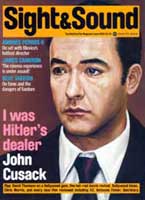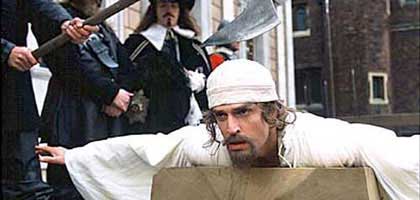
Love of the common people
Film of the Month: To Kill a King

To Kill a King is a rare historical movie that focuses on politics rather than spectacle. By Philip Kemp.
The Commonwealth, that 11-year interlude when Britain shed her monarchy and for the first and (so far) only time became a republic, has become the dirty little secret of our history, rarely referred to and scarcely known. To most people the term 'Revolution' would probably suggest France or Russia, 'Civil War' Spain or the US and even those of us with some awareness of the period most likely recall little beyond Sellar and Yeatman's famous summary that the Cavaliers were "Wrong but Wromantic", while the Roundheads were "Right but Repulsive". The events were momentous for the first time, a monarch, the Lord's Anointed, was deposed and executed not by scheming nobles but by the vote of a parliament and would echo down the centuries. Yet the topic has been largely ignored by British cinema since Ken Hughes' pedestrian Cromwell (1970, with Richard Harris in the title role and Alec Guinness as Charles I) and Andrew Mollo and Kevin Brownlow's worthy but dour Winstanley (1975). Neither movie lit any fires at the box office. So it was courageous of director Mike Barker and his colleagues particularly in view of the disasters that nearly swamped the production not only to tackle this material but to handle it in a way calculated to arouse serious discussion.
Purely on the strength of his two previous feature films, To Kill a King looks like an unexpected departure for Barker. His feature debut The James Gang was an uneasy mix of wacky-family heist comedy and Loachian downbeat realism, while his American venture Best Laid Plans flirted unconvincingly with the conventions of latter-day noir and cried out for a director like John Dahl. But his television work offers more of a clue: he directed two stylish classic adaptations, The Tenant of Wildfell Hall and Lorna Doone, both showing a sure sense of detail and period atmosphere.
These qualities are to the fore in To Kill a King, which kicks off with the aftermath of a battle (apparently Naseby, though it's not identified) devoid of glamour or false heroics. Sombre colours, dark russets and blacks, dominate the 'scope screen. Weary, grimy soldiers pile up a heap of corpses, indistinguishable in their nakedness, crude iron armour is laboriously beaten back into shape, and the victorious Parliamentarian forces seem scarcely more jubilant than their shackled Royalist prisoners. This, evidently, is not going to be history in the heritage mode.
The film was originally to be called Cromwell and Fairfax, and the action is dominated by the relationship between the two men in the years leading up to the execution of Charles I and the consolidation of Cromwell's rule. Thomas Fairfax, a brilliant tactician, was General of the parliament's New Model Army in the later stages of the Civil War, and Oliver Cromwell, an East Anglian squire, his second-in-command. As depicted, the bond between them is as much homoerotic as political, at least on Cromwell's side; though Fairfax at one point half-jokingly accuses Cromwell of being jealous of him for his beautiful wife, it's clearly Lady Anne Fairfax whom Cromwell is jealous of. More than once he refers sardonically to Fairfax's charismatic good looks, which draw the people to his cause, and when at last Fairfax, having frustrated the assassination attempt on Cromwell that he himself instigated, withdraws back into private life, Cromwell protests, "Do you not realise how well you are loved?" Ostensibly he means by the people, but the plea of the jilted lover is unmissable.
In effect, the film becomes a triangle drama, with Cromwell and Lady Anne (Olivia Williams, imperiously sexy) contending for the soul of her husband. Impelled by her own Royalist family and her personal reverence for the king, Anne urges Fairfax towards leniency, while Cromwell uses their shared passion for justice and reform to persuade him of the need to deprive the king of his power (and then, by pitiless logic, of his life).
British historical movies tend to be long on action and spectacle, short on political debate (witness the dispiriting evasions of James Ivory's Jefferson in Paris); To Kill a King is probably the first example since Ken Loach's Land and Freedom to choose the more demanding option. The heart of the action isn't in swordplay and bombast, but in passionate, intense exchanges between two or three people in darkened rooms. To some extent, of course, this route may have been forced on the film-makers by the movie's troubled production history (quite a few projects have gone bankrupt during production, but not many have contrived to do it twice), and for all its effective use of locations the film suffers from a cramped, constricted feel. But whether through choice or necessity, it makes for a refreshingly astringent premise.
The danger of this approach, though, is that in order to dramatise what might otherwise seem like static, talky material, opposing positions may be pushed to extremes, and that's exactly what happens here. In political (and indeed historical) terms, the chief weakness of To Kill a King is that Barker and his screenwriter Jenny Mayhew have opted to demonise Cromwell. The later stages of the film, with gibbeted bodies lining every street and alleyway and Tim Roth's hunched, malevolent figure coming to seem like a cross between Stalin and Robespierre, head increasingly off the rails. Exact historical accuracy isn't required of a feature film, and it hardly matters that there was no public assassination attempt on Cromwell, nor that Fairfax parted company with him not over his supposed rule of terror but over his intention to invade Scotland. But to have the Lord Protector riding the streets of London as an armed vigilante personally gunning down pedlars of royalist relics wrenches the movie into the realms of Blackadder or Monty Python. Ludicrous inventions like this do no justice to Cromwell a far less intolerant and dogmatic figure than depicted here nor to the audience.
A pity, since in its earlier stages To Kill a King bids fair to be the first intelligent movie treatment of British history for many a year, while avoiding the staginess and gloss of, say, A Man for All Seasons or The Lion in Winter. Williams and Roth turn in powerful performances that transcend the limitations of the script, and it's probably not Dougray Scott's fault that, cast as the reasonable guy in the middle, he never quite projects the charisma the role of Fairfax demands. James Bolam, as time-serving Speaker of the Commons Denzil Holles, contributes a fine portrayal of weaselly venality. But the revelation of the cast is Rupert Everett as Charles I, shedding his mannerisms to give us a man fatally blinkered by the delusion of his own divinely appointed invulnerability. There's a riveting moment when, called to trial before the Commons, he abruptly realises the truth of his situation; Everett's eyes seem to glaze as arrogance gives way to dismay. And his dignity on the scaffold, before an awestruck crowd, is moving; this at least comes straight from the history books.
